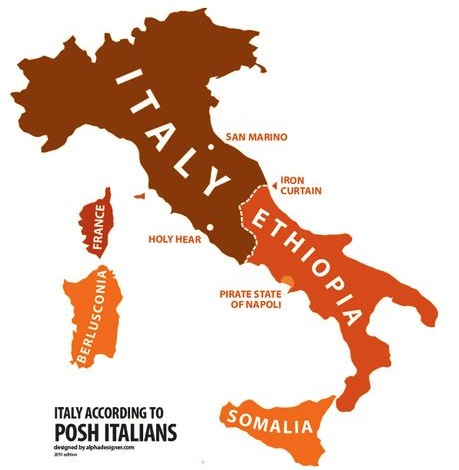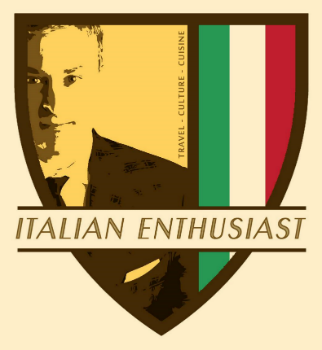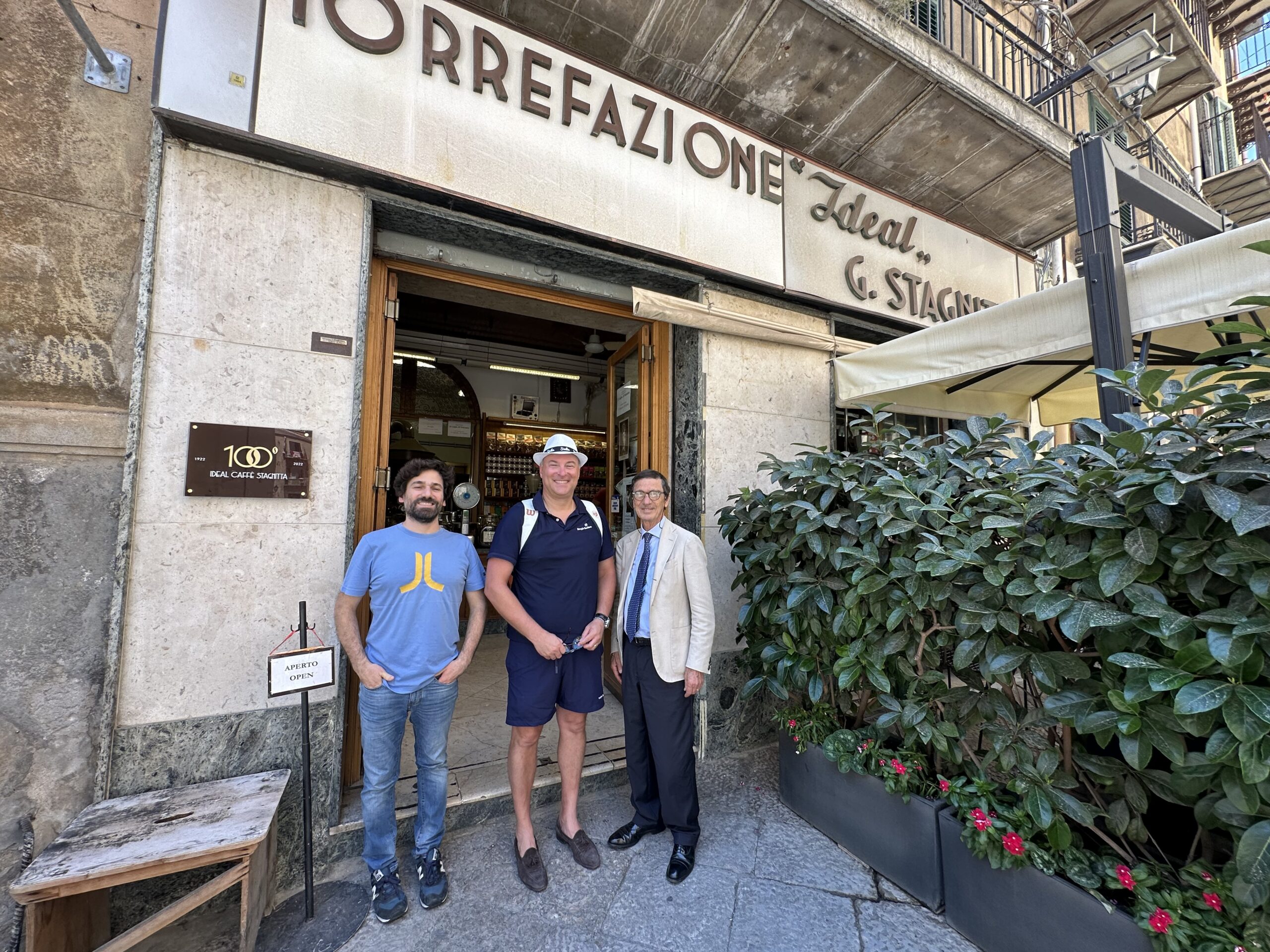The Stereotypes of Italians (in the minds of Italians)

 In Italy, stereotypes are rampant, not only of foreigners but also of Italians. Every time I travel to Italy, I discover another stereotype about a person from a specific Italian region.
In Italy, stereotypes are rampant, not only of foreigners but also of Italians. Every time I travel to Italy, I discover another stereotype about a person from a specific Italian region.
As a fun exercise, I asked a handful of Italian friends from different parts of Italy, including Florence, Naples, Rome & Sicily, to elaborate on the different Italian regional stereotypes. Surely as Americans, for example, we know of our own stereotypes we have for people from different states, and in reality we often know they are just plain ignorant, but they do exist and oftentimes they are quite comical. Stereotypes are prolific in Italy, and for an Italian Enthusiast, it is worthwhile to discover them, because to truly be immersed in Italian culture, it is necessary to understand all aspects of Italian culture, including its stereotypes.
Here is a summary below!
Italy is divided into two main stereotypes: POLENTONI and TERRONI.
The people living in the northern regions of Italy are called “polentoni”, which comes from the food “polenta”. Polenta has historically been one of the most popular foods consumed in northern Italy, and if a southern Italian wants to say something derogatory to a northern Italian, he would say (among other things) “Mangia Polenta!”, which means “Go Eat Polenta!”
People living in southern Italy, on the other hand, are called “terroni” because while northern Italy experienced prosperous economic development in the past century, the southern Italian economy relied on agriculture. “La terra” indicates fields to be cultivated, and “terroni” are people cultivating the fields. Both “polentoni” and “terroni” are derogatory terms.
 In addition to these two general stereotypes, Italy does not stop there. Stereotypes are also broken down and directed at the various regions and cities of Italy. A list (in no particular order) is below. WARNING – the list is not meant to offend, only to have some fun!
In addition to these two general stereotypes, Italy does not stop there. Stereotypes are also broken down and directed at the various regions and cities of Italy. A list (in no particular order) is below. WARNING – the list is not meant to offend, only to have some fun!
Lombardy (Milan): Unfriendly, cold, workaholics, snobs. They only eat polenta.
Piedmont: Courteous, but fake and insincere.
Liguria: Very cheap and frugal. In Italian, we say loro hanno le braccia corte, which means, they have short arms (too short to reach into their pockets for the money). Also, gossipy and inhospitable.
Tuscany (Florence/Pisa/Siena): High usage of profanity, especially using God and the Virgin Mary’s name in vain. Snobish, Arrogant. They believe they speak pure Italian, unlike everyone else from other regions. Also, people from Florence do not generally like the people from Pisa, and vice versa.
Lazio (Rome): Lazy, messy and the people rarely work. Not elegant. Exhibitionists. Scoundrels. Don’t follow the law. Also, people living in Rome are called “burini” because as a result of their dialect, when they pronounce the word “burro” (butter), it sounds as if they are pronouncing the word “buro”. To Americans it may not sound different, but saying “buro” instead of “burro” in Italian is an immediate sign that you are from Rome, and therefore, a “burini”.
Campania (Naples): Thieves, swindlers, superstitious. They believe in things like the corna, cornetto, and malocchio. The corna is an upside down University of Texas Hook ’em Horns, and it is used in an equivalent fashion to when Americans would “knock on wood”. The cornetto is a horn-shaped good luck symbol, and the malocchio is equivalent to the evil-eye.
Calabria: Mafia, stubborn, proud. Strange dialect. There is an Italian radio show that mocks the extreme dialect from Calabria.
Sicily (Palermo): Mafia, passionate, jealous, possessive, eat like pigs. All Sicilians have names that end in terms of endearment, like “Nunziatina and Pinuccio”.
Abruzzo: Kind and strong, but stubborn. Eat a lot of meat.
Marche: There is a saying in Italy – “It is better to have a dead person inside the home than have a person from Marche at the front door.” (meglio un morto in casa che un marchigiano dietro la porta). The reason for this saying is that years ago, the people from Marche were the tax collectors and they went door to door collecting taxes for the Pope. Many people became angry over this and hence they never wanted people from Marche to come to their home.
Emilia Romagna: Communist, excellent at ballroom dancing, eat too much lasagna.
Veneto (Venice): Workaholics, alcoholics, and they eat cats. Always drive drunk, even after lunch when their cars zig zag all over the place. People from Venice also believe they are better than people from other towns in the Veneto region. People from Treviso are perfectionists and disciplined. There is a saying in Veneto as follows, “Veneziani gran signori, Padovani gran dottori, Vicentini magna gati, Veronesi tuti mati, Trevisani pan e tripe, Rovigoti baco e pipe, Belunesi pochi sesti” and this refers to people of the many cities of the Veneto region.
Trentino-Alto Adige: Precise and rigid, like German people. Wannabe Germans. They prefer Germans over Italians. Very particular.
Sardinia: Stubborn, and short in stature. Overbearing. Jealous and proud.
Friuli Venezia Giulia: Cold and close-minded.
Basilicata: A forgotten region.
Puglia: They all live in homes called “trullo”, which is an Italian version of a tee-pee.
Aosta Valley: Close-minded. Impossible to understand when they talk because they speak a strange dialect which includes a mixture of Italian and French. Mountain people.
Molise: Superstitious, and emphasize the importance of the female role.
Umbria: Close-minded and modest. Mountain people.
I welcome all contributions to add to the list. If you know of a stereotype that differs from the above, please share (as well as your source)!!
Lastly, the first photo I’ve included on this post of the map of Italy was created by an artist named Yanko Tsvetkov. He’s created many humorous maps of the world depicting prejudice from various perspectives. If you like the map, you can visit his site at: www.atlasofprejudice.com for more. While I cannot confirm whether or not the map is an accurate depiction of Italian stereotypes (i.e., the Ethiopia and Somalia reference), I can confirm the existence of a famous saying that northern Italians say, “dal po in giù l’Italia non c’è più,” which means basically that south of the River Po, Italy is no more. Interestingly, since the River Po is in fact way up north, if this were true, then only about 1/5 of Italy would in fact be considered Italy by the northerners.
Recommended Posts

THE BEST FAMILY BEACHES OF SIRACUSA, SICILY
June 21, 2024
Comments
Comments are closed.



In Veneto only people from Vicenza are cat eaters (“vicentini magna gatti”)
Like in Toscana also in Veneto blasfemia is very common (“Dio” + noun) is used as a conjunction.
Source: I was born and raised in Belluno (Veneto)
Thanks for your input, Flavio. I love the saying “vicentini magna gatti”! Very interesting.
I was raised in Rovigo… Absolutely dislike our dialect…so rude and profane…
Bravo e grazie Flavio. I was born and raised in S. Giustina, Belluno and I remember many times they call us ‘I Bellumat’.!!!
… to implement Veneto description you can include the full version of the saying: Veneziani gran signori ,Padovani gran dottori, Veronesi tutti matti, Vicentini magna gatti…we are really proud of distinguishing our majors cities!!!
I would like to make a slight correction, with all due respect. Having lived in Italy for long periods at various times in my life, especially in Rome, I have some direct experience of the sorts of things mentioned in this article, and I know, for example, that the term “burini”, in Rome, refers not (or not primarily) to other Romans, but to Italians from the provinces who come to Rome with all their coarse country ways. The term is believed to derived from farmers who would come into town to sell their butter to the city folk. While “burino” may also be used by a Roman to put down another Roman, the implication remains that of someone at least originally, or by family origins, from the sticks, Rome having been repopulated, after the Italian unification ca. 1870, mostly by people from other regions. It is also important to point out that while Italians from other regions (especially the North) may think of Romans as inelegant, the Romans themselves, especially those of the ancient aristocracy, consider themselves the peninsula’s finest fruit.
I like your observation that Romans consider themselves “the peninsula’s finest fruit.” It reminds me of when my wife and I were in Rome on our honeymoon, and I told her that the Romans seemed to have a quiet, unassuming superiority, almost as if they were saying to themselves (and to others, as well), “That’s right, our ancestors once ruled the known world.” My grandmother was from Torre Annunziata, and I was fortunate enough to have lived in Naples in the late ’60s when my father was stationed there in the Navy, so I love Italy and Italian culture.
Ben detto!!!!Io sono romana, nata e vissuta li fino all’eta’ di 25 anni, ed abbiamo sempre considerato “burini”quelli che venivano da fuoriRoma…CAPITO ?
Burino indica chi viene fuori da Roma, infatti nel passato i pastori che venivano dalla provincia si fermavano sulle mura di roma per vendere il burro. Da qui il termine “burino”. Nulla a che vedere con la pronuncia della “r”.
You are correct, I was born in a small medieval town east of Rome, yet educated in Rome, BURINO refers to an unpolished citizen not from the city, however the term is used as a reference not as an offense.
I was born in Abruzzo and raised there till I was 11 years old. I go back every other year sometimes every year. The Abruzzese motor is Forze e Gentile. Not sure where “eats a lot of meat” came from. Meat was pretty scarse growing up. Even though my maternal grandparents had a farm. My mother would by a little meat for Sunday sauce. Now when I go, they do not eat as much as Americans do. Just spent 10 days in Sicily, they seem to be the same. Keep in mind that Abruzzo is very mountainous. They eat mostly lamb and pork. Porchetta is the best.
My parents were born in Vasto. I never heard that before “lots of meat” they ate a lot of fish in addition to the meats you mentioned.
Lombardia, ( la mia opinione, ) cosi diversa da tutte le altre regioni italiane, per chi la conosce bene, coi suoi laghi , le sue montagne, e la sua grande pianura, le diversita dei popoli, ( rivali tra loro, ma uniti da due aggettivi lavoratori onesti e creativi.)
Very Interesting…I do not speak the language (my ancestors dropped the Italian language {except for rare instances} and tradition.) I am not even half Italian but I have always wanted to go back to the region from which my grandapa and great grandmother are from….just to see what my people look like. I also am half Haitian and have some German and Scand. ancestory mixed in there. This is an interesting article!!
The forgotten region that people jokes does not exit because nobody ever meet One of them is considered Molise not Basilicata
Basilicata people are too busy making Amaro Lucano and worrying what’s for lunch.
Lombardia, Brescia e provincia presenta un paesaggio sempre diverso a seconda che sia pianura, monti o laghi; cittadini industriosi, che conoscono bene l’arte dell’arrangiarsi amichevoli e generosi. Una sola pecca, i vari dialetti che spesso sono incomprensibili, es: il dialetto di Lumezzane. Chi sa cosa e’ la “bestia bleu? O la besacagna?
Anything to say about “aperitivo”? Veneto thinks aperitivo was born there with Aperol Spritz (prosecco and aperol), but real aperitivo was born in Brescia with Pirlo (still white wind and Campari that can be substituted with Aperol for a light version).
Well I was in Veneto 2 weeks ago and I saw a bunch of Italians drinking Aperol Spritz at 10:30 a.m…
Molise: Does not exist. Seriously.
I was concerned that Molise would not even be mentioned, but was relieved to find it near the end.
I believe that the saying “Meglio un morto in casa che un ….. dietro la porta” was a “pisano” due to the florentine unappreciation for people from Pisa!
Joseph my grandparents on my dad’s side of the family came over from Naples and I have heard them say that Which means Friend.
My relatives came from Basilicata, and they always said the folks from Bari were showy. They were the ones with velvet upholstery, crystals hanging from the lamps, and over-the -top Christmas decorations. Calabrese were stubborn, and don’t even mention Sicilians. I once was sent to the store to buy a loaf of bread, and I got an earful from my aunt because I bought the wider Sicilian loaf rather the the more baguette-like Neapolitan loaf.
What about Genoa?
They say people from Genoa are very frugal.
My Italian grandma (Bari) wasn’t prejudiced against any race,etc….but if you came from Italy, she would immediately demand from what city you were from. Also when I copied her to learn Italian she would correct me, and say that wasn’t the true Italian. Then she would give me the Tuscan version. very confusing
I was born in Lucca (Tuscany) and I came to the United States when I was 23 years old. From the various comments it is evident that “campanilismo” (the love of the town bell tower) is the common disease of every Italian, including myself of course. But this rivalry and the common practice of putting down people of other regions or cities other than your own is what makes Italy interesting, different, full of pep and variety, with never a dull moment…
The Lucchesi (Luccans) cannot stand the Pisans, all this deriving by the middle ages fighting and despising each other… E la vita continua….
And what do they say about the Island of Capri